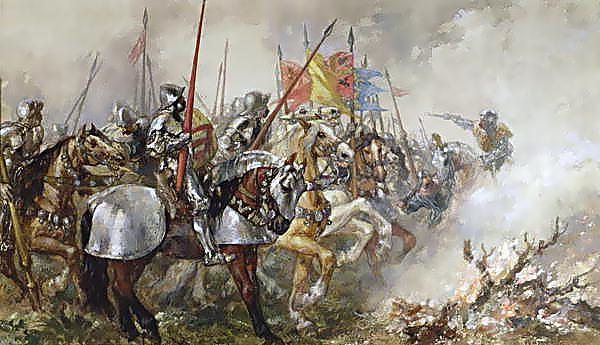It happened today - October 25, 2015
 We happy few, we band of brothers. On Oct. 25, 1415, Henry V and his English archers won a stunning victory at Agincourt, slaughtering the arrogant flower of French nobility. It was a glorious if pointless victory.
We happy few, we band of brothers. On Oct. 25, 1415, Henry V and his English archers won a stunning victory at Agincourt, slaughtering the arrogant flower of French nobility. It was a glorious if pointless victory.
It was glorious partly because Shakespeare made it so, putting into Henry’s mouth a magnificent “St. Crispin’s Day speech” that came unbidden into the minds of more than a few British and Canadian soldiers as they approached the beaches on D-Day. I’m not sure Henry was that good a king, or a speaker, but if he came close to that kind of eloquence he certainly should be remembered for that at least.
It was also glorious because Shakespeare touched on an important truth: As so often in the history of Anglosphere liberty, the core of the victory was the unity of the common people with their political leadership derived from the accountability of that leadership to the commoners. It wasn’t titled ponces but English yeomen whose deadly and unflinching archery won the day against French arrogance. (And ironically, those soldiers hearing “He that outlives this day” etc. suddenly risen from the graves of their high school English classes on June 6 1944 were going to rescue those same French from yet another geopolitical disaster inflicted by their arrogant elite.)
The victory at Agincourt was also pointless. Henry had no business waging war in France in an attempt to seize the French crown that was as futile as it was dangerous to English liberty, he died of dysentery seven years later, at 35, while still fighting in France, the Hundred Years’ War was lost shortly thereafter and England descended into the anarchy of the Wars of the Roses under his young and incapable son Henry VI that ended with the generally wretched Tudors taking the crown because everyone else was dead, followed by the thoroughly wretched Stuarts because the Tudors died out.
Henry V should have stayed home and minded his own and his nation’s business. Even if we’d have lost that speech Shakespeare drafted for a long-dead king.